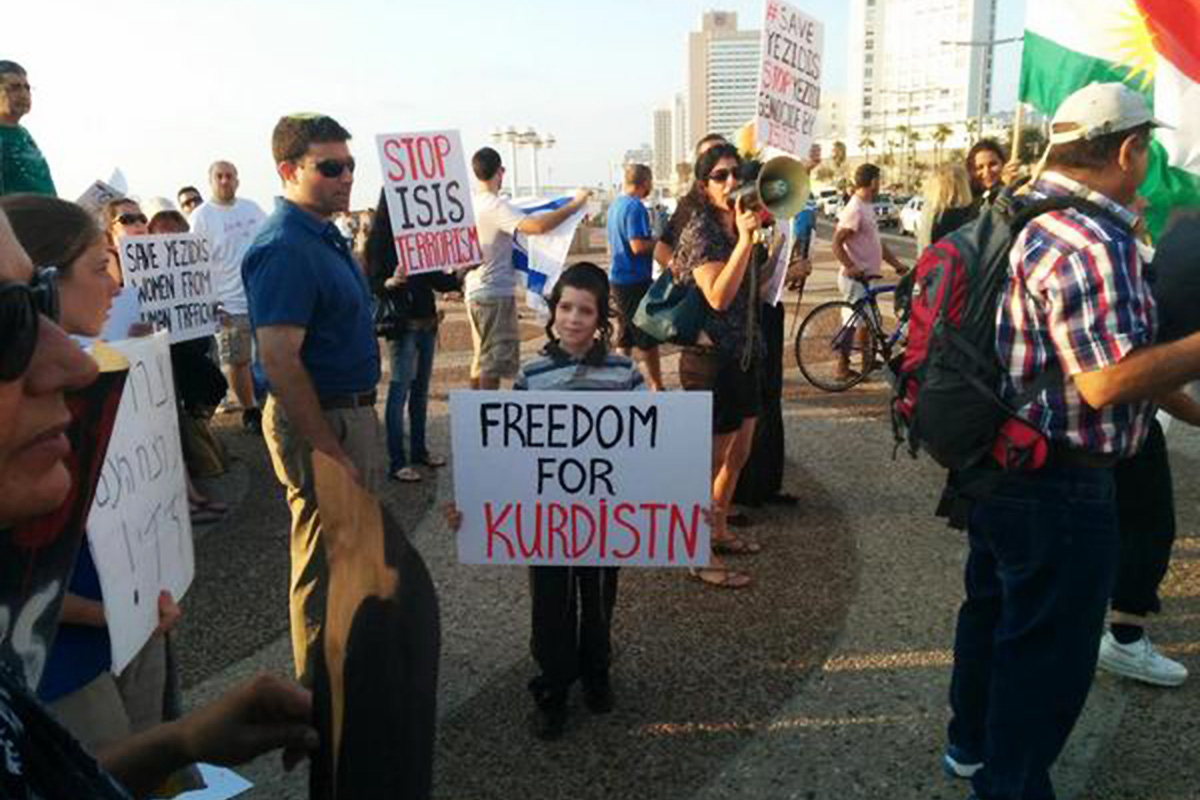Israelis Call for Supporting Iraqi Minorities
Israelis have been rallying behind Iraqi minorities with public showings of support for Yezidis and Christians as they face unrelenting attacks by Islamic militants in northern Iraq.
Israeli Kurds and a group called the Combat Genocide Association have led many of the campaigns calling for the international community and Israel to step in to protect religious and ethnic minorities in Iraq, including holding protests in Tel Aviv and Jerusalem.
At one protest during the siege of Shingal mountain, where Yezidi Kurds fled Islamic State (IS) attacks earlier this month before being rescued by US and Kurdish forces, Israelis gathered on Tel Aviv’s beachfront boardwalk opposite the US Embassy raising Kurdish and Israeli flags and signs in support of the Yezidis and Kurds.
“I think Israel has to do something overt,” said protester Ben Yosef. “But we know Israel is afraid of doing something openly, so Iran won’t hurt the Kurds. We are worried about them, and are trying to raise money for medicine and the like.”
Several dozen protesters also demonstrated in front of Prime Minister Benjamin Netanyahu’s residence in Jerusalem, calling for Israeli aid to Iraqi Kurdistan and to support minorities in the region.
Although Israelis have cheered the movement on social media, there are looming questions about Israel’s involvement and whether the campaign has any impact on policy.
Israeli leaders, including former President Shimon Peres and Netanyahu, have openly supported Kurdish independence but there is no official relationship between Israel and the Kurds.
There is believed to be a history of covert Israeli support for the Kurds and there is no shortage of speculation that Israel has provided security and economic aid to Iraqi Kurdistan. Still, Israel and the Kurdistan Regional Government (KRG) are tight-lipped on whether informal ties exist.
“We aren’t commenting on our relations with the Kurds,” Israeli Foreign Ministry spokesman Yigal Pamor told Rudaw. “This is not something we usually speak about openly.”
Asked whether Israel was planning to join US-led strikes on Islamic State (IS) fighters to support the Kurdish counteroffensive, Palmor said, “There is no great need to say what we think of the Islamic State. I think it is quite obvious.”
Citing logistical difficulties around the distance between Kurdistan and Israeli air force bases, Palmor said Israel did not carry out any humanitarian airdrops to Yezidis and other groups surrounded by IS.
In addition to the demonstrations, some Israeli commentators have also called for their government to get more involved, arguing that it could help Israel create closer ties with Iraqi Kurdistan and improve Israel’s image in the wake of the bloody war with Gaza, called “Operation Protective Edge.”
Writing in the newspaper Israel Hayom, David Brun asked, "Why, for example, don't we give some of (the minorities) refuge, even if it's temporary?... Maybe, just as the prime minister hinted recently that new alliances are being formed behind the scenes of Operation Protective Edge, we have an opportunity to show a sense of being good neighbors, to extend a hand, and who knows, maybe even to gain new alliances. At the same time, we will add another important page to the impressive blue and white humanitarian record. This is the time to act."
Emanuela Siyar Barzani, one of the Kurdish organizers of rallies in Tel Aviv and Jerusalem, said she helped pull together the protest out of a belief “that the democratic Israeli society must wake up to what is being done in neighboring countries — in this case, ethnic cleansing that crossed the red line. Of course, the subject of Kurdistan is close to me, and I thought that this is the time to show solidarity with the Yezidis and the Kurds.”
“We organized the demonstrations because of our deep identification with the Kurdish nation, which is going through this very difficult period,” said Yehuda Ben Yosef, chairman of the National Organization of Kurds in Israel. “We are trying to wake up Israel, the US and the UN.”
The crowd of about 70 protesters in Tel Aviv was remarkably diverse and included religious and secular Israelis, the elderly and the youth and supporters from both ends of the political spectrum. Ultra-Orthodox Jewish children waved Kurdish flags.
“Everyone who came, Kurdistan touches their heart,” Barzani said.
Cars driving along the beach honked their horns in solidarity.
Margalit Lavron, a Kurdish-Israeli whose mother is from Amediya and whose father is from Zakho, said in Tel Aviv supporters told them to “keep demonstrating until someone wakes up and does something.”
Source: Rudaw

